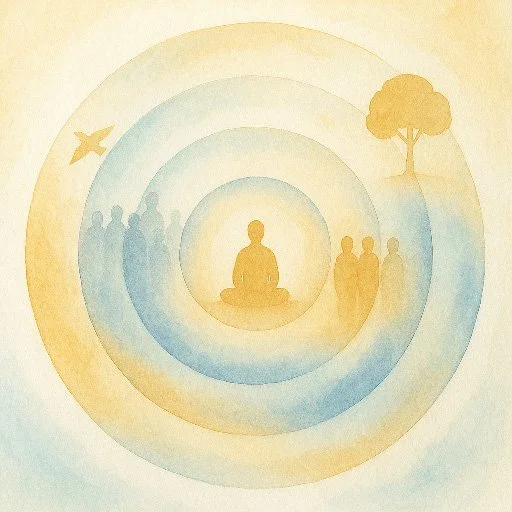Loving-Kindness Meditation: A Heart-Centered Practice for Anxiety Relief

Loving-kindness meditation follows a structured approach of expanding compassion through concentric circles of connection.
Contents
- What Is Loving-Kindness Meditation?
- How Loving-Kindness Meditation Works
- Practicing Loving-Kindness for Anxiety Relief
- Research-Backed Benefits
- Digital Tools for Loving-Kindness Practice
- Getting Started with Your Practice
- FAQ: Loving-Kindness Meditation
What Is Loving-Kindness Meditation?
Loving-kindness meditation for anxiety (often called Metta meditation, from the ancient Pali word for benevolent love) is a heart-centered practice that turns your focus toward warmth, compassion, and positive wishes for yourself and others. Instead of trying to empty the mind, you fill it with intentional goodwill.

Loving-kindness meditation focuses on cultivating warmth and compassion, starting with yourself and extending to others.
Practitioners silently repeat phrases such as "May I be happy, may I be healthy," then extend the same wishes to loved ones, neutral people, difficult people, and—eventually—all beings. That simple shift from fear or frustration to empathy can have a surprisingly powerful effect on mood and outlook.
Research shows compassion practices reduce stress and anxiety while increasing positive emotions.
Why Loving-Kindness Works for Anxiety
Many people explore loving-kindness meditation techniques for anxiety relief because it gently counters the harsh self-talk that often fuels worry. When you're anxious, the mind can spin critical or fearful thoughts ("What if everything goes wrong?"). By cultivating kindness and understanding, you train the brain to meet those thoughts in a friendlier, less threatening way.
Over time, this practice builds an internal sense of safety—like giving your nervous system a soft hug. A landmark eight-week trial found that daily loving-kindness sessions broadened positive emotions and built psychological resources such as resilience and social support.
How Loving-Kindness Meditation Works

The practice expands compassion through concentric circles: from self to loved ones, neutral people, difficult people, and all beings.
During a metta meditation session, you move through a series of targets: yourself, a loved one, a neutral person, someone difficult, and finally all beings. Including everyone—even that rude driver—stretches your capacity for understanding. This doesn't excuse harmful behavior; it simply frees you from carrying anger in your own heart.
A brief seven-minute practice was enough to boost social connection feelings toward strangers in a lab study.
The Neuroscience Behind Compassion
From a mental-health perspective, loving-kindness meditation benefits shine at tackling social anxiety, loneliness, and self-criticism. Brain-imaging research shows regular practice increases empathy-related brain activity and strengthens networks that reduce distress.
People who once found it hard to accept a compliment often report that compassion meditation practices soften the inner critic. The brain literally rewires itself to be more accepting and less harsh.
Practicing Loving-Kindness for Anxiety Relief

The practice generates genuine feelings of warmth and compassion that radiate outward to others.
Getting started with how to practice loving-kindness meditation is simple; adapt the steps until they feel right:
The Six-Step Practice
- Find a Comfortable Posture. Sit or lie down in a quiet spot, close your eyes, and take a few slow breaths.
- Begin with Yourself. Silently repeat phrases like "May I be safe. May I be happy. May I be healthy. May I live with ease." If resistance shows up, acknowledge it and continue gently—you're planting seeds even if you don't feel warmth yet.
- Extend to Loved Ones. Picture someone dear and offer the same wishes. Visualizing their smile often stirs genuine warmth.
- Extend to a Neutral Person. Someone you barely know—a barista or coworker—has hopes and struggles too. Wish them well.
- Extend to Someone Difficult. Choose a mildly challenging person (not a traumatic figure) and wish them peace. This step slowly loosens resentment.
- Embrace All Beings. Broaden the wish to every creature: "May all beings be safe, happy, healthy, and at ease." This reinforces a sense of shared humanity.
Tips for Success
The key is feeling the phrases, not just thinking them. If genuine warmth flickers, let it soak in. Should distraction arise, bring attention back without judgment. Even short daily sessions can spill over into life.
For anxiety relief meditation specifically, loving-kindness offers a positive anchor. Next time worry storms in, pause and send kind wishes—perhaps just to yourself. It's difficult to stay in fight-or-flight while sincerely generating goodwill.
Research-Backed Benefits

Research shows loving-kindness meditation increases brain activity in areas linked to empathy and emotional regulation.
The scientific evidence for metta meditation benefits continues to grow:
Mental Health Improvements
In a year-long study, university students who practiced loving-kindness showed lower depression, anxiety, and stress versus peers who did not meditate.
Physical Health Benefits
Other trials confirm that compassion training reduces inflammation and improves immune markers. Studies link meditation for self-compassion to lower heart rate and reduced stress hormones.
Social and Emotional Benefits
A recent meta-analysis found loving-kindness interventions boost positive mood and moderate negative emotions across diverse groups. Over time, many practitioners report that baseline anxiety drops and feelings of social isolation fade.
Digital Tools for Loving-Kindness Practice

Modern apps and digital tools can provide guided loving-kindness meditations tailored to your specific needs and experience level.
While heart-centered meditation is an ancient practice, modern technology can make it more accessible and consistent in your daily routine. Digital tools can provide:
- Guided loving-kindness sessions for beginners
- Customizable meditation lengths (5-30 minutes)
- Reminders to practice self-compassion throughout the day
- Progress tracking for building consistent habits
Apps like Wellness AI can create personalized loving-kindness meditations that adapt to your current emotional state and specific anxiety triggers, making this ancient practice more relevant to your modern life.
Getting Started with Your Practice
Remember, this is called a practice for a reason. Early sessions might yield only a slight softening; later, you could feel waves of warmth or even tears as stored anger releases. Go at your own pace. Even a few minutes a day can light a small compassionate candle—one that, with consistency, brightens the mind's darker corners.
Government health resources note that meditation practices are generally safe and can complement medical care for anxiety or depression. Over time, loving-kindness helps many feel more connected, less alone, and more accepting of life's uncertainties—a powerful, low-cost tool for everyday mental wellness.
Building Your Daily Practice
Start with just 5-10 minutes daily. Choose a consistent time—perhaps right after waking or before bed. As the practice becomes natural, you can extend sessions or use loving-kindness phrases throughout the day when stress arises.
The beauty of loving-kindness meditation techniques is their flexibility. Whether you're dealing with workplace anxiety, relationship stress, or general worry, the practice adapts to meet you where you are with exactly the compassion you need.
-Tim, Founder of Wellness AI
FAQ: Loving-Kindness Meditation
How long should I practice loving-kindness meditation?
Beginners can start with just 5-10 minutes daily. Research shows benefits from sessions as short as 7 minutes, while longer practices (20-30 minutes) can deepen the experience. The key is consistency rather than duration—a brief daily practice is more beneficial than occasional long sessions.
What if I don't feel anything during loving-kindness meditation?
This is completely normal, especially when starting. Many people don't feel immediate warmth or compassion, and that's okay. You're still "planting seeds" by repeating the phrases. With consistent practice, most people begin to notice subtle shifts in their inner dialogue and emotional responses, even if dramatic feelings don't arise during meditation.
Can loving-kindness meditation help with social anxiety?
Yes, research specifically shows loving-kindness meditation can be very effective for social anxiety. The practice helps counter harsh self-judgment and builds feelings of social connection. Studies demonstrate that even brief sessions can increase feelings of connection toward strangers and reduce social isolation.
Is it normal to feel resistance when sending loving-kindness to difficult people?
Absolutely normal and expected. Start with mildly difficult people rather than those who have caused serious harm. The goal isn't to excuse their behavior or force forgiveness, but to free yourself from carrying anger. If strong resistance arises, you can skip this step initially and return to it as your practice develops.
How is loving-kindness meditation different from regular mindfulness meditation?
While mindfulness meditation typically focuses on present-moment awareness and observing thoughts without judgment, loving-kindness meditation actively cultivates positive emotions and goodwill. Instead of emptying the mind, you're filling it with compassionate intentions. Both practices complement each other well and can be part of a comprehensive meditation routine.
Can I practice loving-kindness meditation if I have depression?
Research shows loving-kindness meditation can be helpful for depression, particularly in reducing self-criticism and increasing self-compassion. However, if you're experiencing severe depression, it's important to work with a mental health professional. The practice can complement but not replace professional treatment when needed.